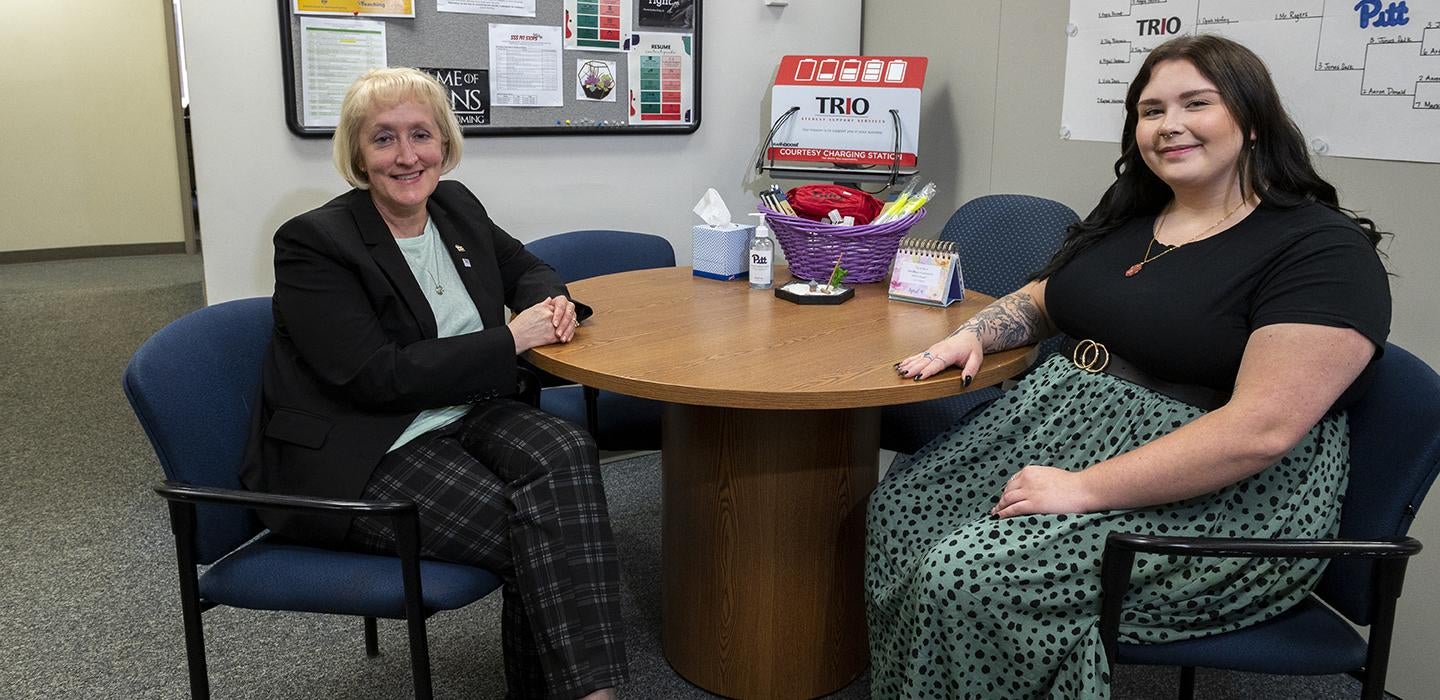
Subscribe to Pittwire Today
Get the most interesting and important stories from the University of Pittsburgh.Elizabeth Shunk said she felt “clueless” in the days before fall classes began in 2019.
She had just left the familiar confines of her Johnstown, Pennsylvania, home for bustling Pittsburgh. Even more daunting: By beginning her studies at the University’s Pittsburgh campus, she was becoming the first person in her immediate family to attend college.
Neither of her parents had finished high school, so they couldn’t offer advice or direction on navigating college, particularly the large urban campus that so was different from the more rural community where Shunk had lived since elementary school.
Which classes should she take? How would she get around the city? Would she feel alone? How would she fill the lingering gaps in her financial aid? Shunk, now a senior social work major, said she found her early days on campus “absolutely overwhelming.”
Fortunately, help was right by her side through Pitt’s TRIO Student Support Services (SSS), a resource hosted by the Kenneth P. Dietrich School of Arts and Sciences.
TRIO, a national organization, began in the early 1960s, drawing its name from a set of three federally funded programs designed to support under-resourced students pursuing college degrees: Upward Bound, Talent Search and Special Services for Disadvantaged Students (later renamed Student Support Services). The pioneering “trio” of initiatives were built to encourage access to higher education.
Pitt’s TRIO SSS, which is celebrating 50 years of continuous federal funding through the U.S. Department of Education, is among the programs making a difference to this day.
For Shunk, the friendly faces at Pitt’s TRIO SSS filled in where her family could not.
TRIO’s Lead Academy brought her to campus a week before classes began to learn how to manage campus life, hunt for scholarships, meet alumni and kindle new friendships.
Since sophomore year, TRIO has helped her become a peer mentor, host workshops with Lead Academy and become a teaching assistant.
“I have gained so many leadership skills,” said Shunk, who is eager to begin a career in social work to help people with mental health challenges.
[Pitt received a $1 million grant to support limited-income, first generation undergrads.]
The momentum TRIO SSS has given Shunk is representative of the kinds of life-changing trajectories it provides to those who are the first in their families to go to college. In the United States, more than 6 million undergraduates — about one in three — are first-generation students.
A recent study from the Higher Education Research Institute found that only 27 percent of first-generation students graduate with a bachelor’s degree within four years, compared to 42 percent of those with parents who attended college. That gap persists when the window for graduation is opened to six years, with only 54 percent of first-in-their-family students at public institutions earning bachelor’s degrees, as opposed to 68 percent of people with college-educated parents.
At Pitt, TRIO’s mission is getting this group of students to college via TRIO Upward Bound and TRIO Talent Search and keeping them there to graduate via TRIO SSS.
Then, said, Michele Lagnese, director of Pitt’s TRIO SSS, part of the job and the joy is watching the ways in which the students develop self-confidence and begin to give back to their communities, the commonwealth and the world.
Lagnese is a first-generation college graduate herself. So is much of her staff. They also understand the financial challenges many of their students face.
“We know what it is like when your roommates are going out to lunch but you have to go off to work. Some to one or even two jobs,” she said.
She’s worked with TRIO for 25 years, serving seven of those years at Pitt. The students eligible for TRIO come into a community, she said. “We understand the unique obstacles they face and we try to build a place of belonging.”
Lagnese and her staff of five serve about 250 students each year. Pitt is one of few institutions in the nation to host TRIO for such an extensive time. There’s a program at Pitt’s Bradford campus, too.
In the 2017-2018 cohort (the most recent class for which data is available), 84 percent of TRIO-involved students have graduated or will graduate by May 2022. Over the past six years, Pitt TRIO SSS has met or exceeded a 78 percent six-year graduation rate each year.
When it came to the financial challenges Shunk anticipated grappling with during her college career, Pitt’s TRIO was again there to help. Staff directed her to higher-paying work study opportunities and negotiated for her to amass more work hours — all efforts that helped her more easily afford housing, dining, textbooks and a new laptop. They also connected her to the Elsie Hillman Scholars Program, which links students to their passions in civic engagement. Shunk was interested in educational equity and found her way to Literacy Pittsburgh, an adult education program where her work also served to satisfy a critical social work practicum.
Altogether, the help opened space and resources for her to do things like go out to dinner with friends.
“I can afford to be a person,” she said. “If I wasn’t able to socialize, I don’t think I would be as happy on campus.”
Shunk said that Pitt’s TRIO support has empowered her to be on the Dean’s List every semester she’s been at the University. She graduates in December 2022 and plans to seek a master’s degree in social work at Pitt.
“I don't know what I would have done without TRIO,” she said, “One hundred percent. It’s given me peace of mind and people who care about me.”
— Ervin Dyer, photograph of Lagnese and Shunk by Tom Altany
For 50 years, Pitt’s TRIO Student Support Services Program has embraced first-generation and low-income college students, empowering them to lift themselves up — and their communities, too. Pittwire is telling their stories in a limited series.


